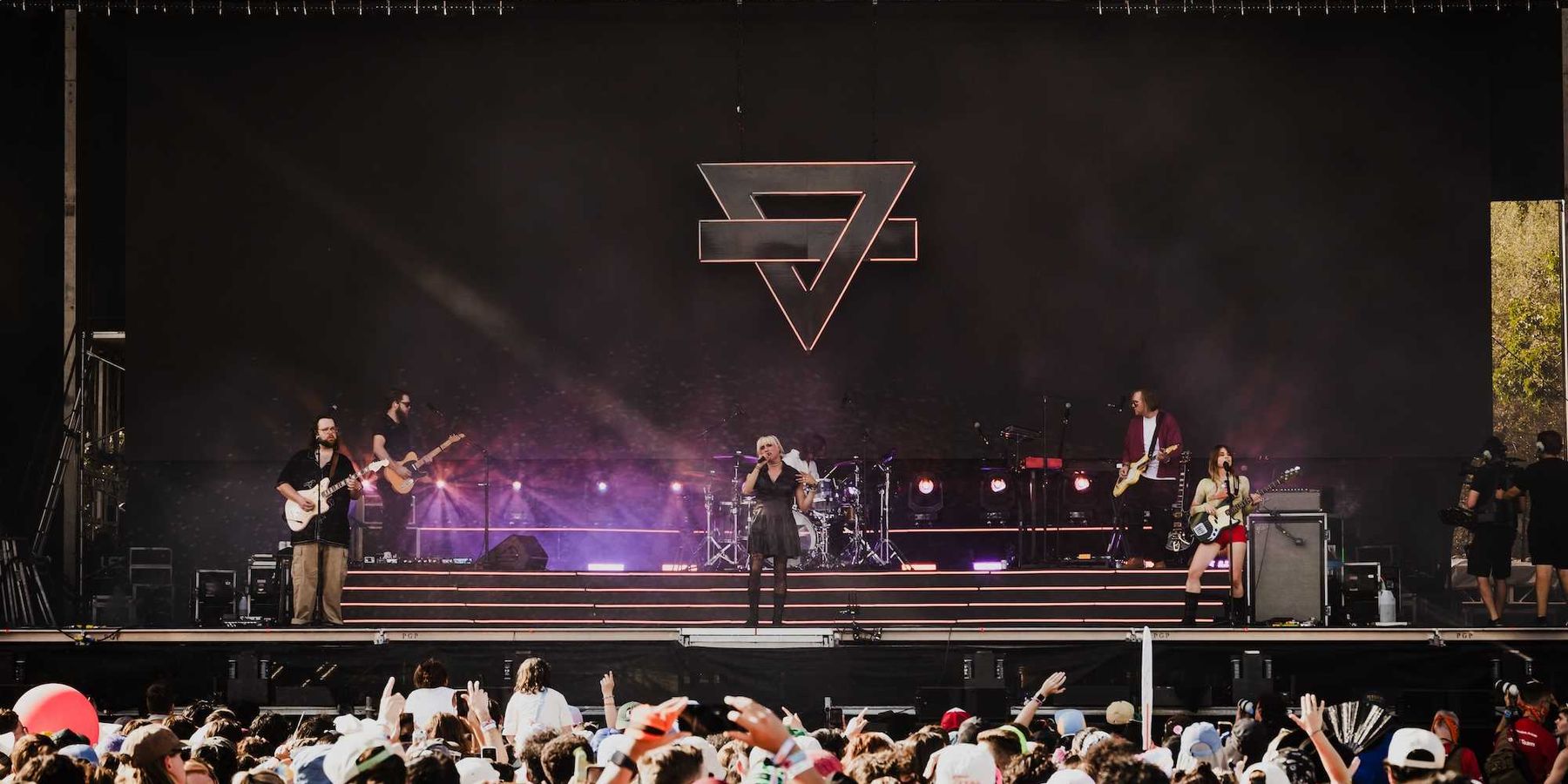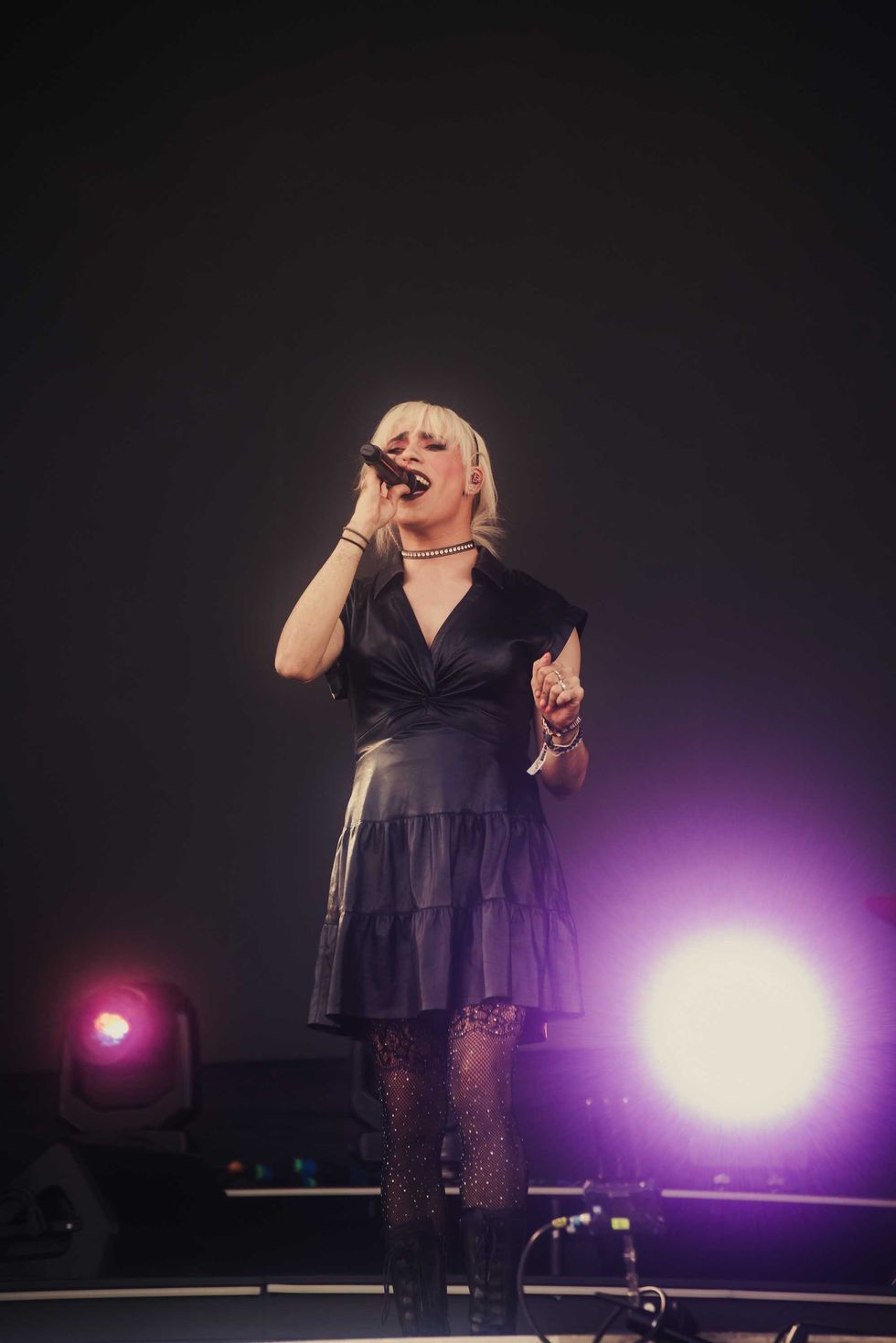
Rainbow Kitten Surprise Feel It In Their 'Bones'
BY
Erica Campbell | Oct 23, 2025

Rainbow Kitten Surprise are comfortable trotting down unexpected paths — whether those ventures take them to uncharted emotional, sonic, and even genre-bending territory. In fact, their latest album bones is an audible testament to that fact, a vulnerable, melodic, memory-laden romp of tracks that sees the band at their most collaborative. And to think it all started via a collab request from (you’re never gonna guess this) Fred again...
“I had just seen him do a killer set,” lead vocalist and songwriter Ela Melo tells PAPER. We’re sat backstage at Austin City Limits a couple of hours before the band’s festival set. Lounging in their trailer, they’re relaxed, exchanging glances, and smiling as they relive the moments that led to their latest album. “I wasn’t very familiar with his music before that," Melo continues. "I was like ‘That’s awesome, what he’s doing, most DJs aren’t playing and singing like that.' It was an experience. Then someone in his camp, one of his managers, was like, ‘Hey! Maybe there’s room for a collab?’”
Melo sent his team over a couple of demos in the hope of bringing an RKS and Fred again.. track to life … then she sent some more. Then, some more. “Before you know it, we had done like 30 songs.” Those songs (that still haven’t made it into a Fred again.. track, yet) were the impetus for bones — a brilliant sonic journey that evocates what it's truly like to be human — the highs, the lows, the ecstasy and the tumult.
The North Carolina-born band, known for their electric performances (which PAPER got to witness side stage later that day in the Texas heat), has been churning out soulful indie-rock since they came together in 2013. Last year, they released Love Hate Music Box after taking a six-year break from dropping new music. That hiatus also took place during a period of writer's block and mental health tumult for Melo, who was later diagnosed with bipolar disorder, and, along with the band, had to cultivate new ways to balance success, music, and life in the spotlight. For their part, they all took in stride — embracing collaboration, new ways of creating, and a new appreciation for vulnerability that you can hear and feel when listening to bones.
The first thing I want to talk about is the Fred again.. situation. How did that happen? How does he play into the lore of the album?
I had just seen him do a killer set. I wasn’t very familiar with his music before that. I was like That’s awesome, what he’s doing, most DJs aren’t playing and singing like that, it was an experience. Then someone in his camp, one of his managers or something, was like “Hey! Maybe there’s room for a collab?” I had them send over some music, then I went over and did a couple of demos and sent them off. Then I was like “No that’s not quite it, can you send some more?” Before you know it, we had done like 30 songs.
It sounds like a sprint.
It did just spur on, this thing. For me, the process of demos is so often that. One thing really inspires the next. Then you get on a roll and want to keep going. The moral of the story is that the story doesn’t end with anything … [Laughs]. We’re waiting to hear back.
And that’s why we’re here. I’m curious, you’re sending these demos, it’s turning into something. When was the moment you realized it was becoming the next album?
How many songs did we have in total in the drive? I think it was like 100. I think the moment we knew it was an album … we locked ourselves in the house for 20 something days. We did a song a day, fleshing out the demos, seeing what worked and what didn’t. I think we knew it was an album just seeing all the demos. And also, the day we were all chilling and “Bones” came on. In my mind, that was the moment we knew we were onto something.
What was it about the song? What was it about that moment? You talked about the room lighting up. Was it the lyrics? What was it?
There was something nostalgic about us being together, going out together. That was what everyone came to. We needed it. It was wild.
That’s so funny when you let yourself listen to it externally, and you’re like “This is good, it doesn’t even matter that we’re the ones who made it.” Approaching this album from the place you did what’s the biggest difference between this and Love Hate Music Box?
I think that Love Hate, since there was so much time between that and the album before it … both in life and musically, it was [bones] is a snapshot of where we are right now. It's different than just a period of a few months. Whereas Love Hate was created over six years.
That’s insane. Do you feel like you could have made an album like bones without having made Love Hate Music Box?
I think it’s way more than just getting stuff out musically. It’s really coming together as a band and learning how to reconnect with each other and reconnect with music. Even with the live shows, to a degree. It took us touring Love Hate, because we talk about how we used to be such a live-focused band, we wanted to be able to play it and have fun playing it and have a visceral audience reaction from it. That determined what the songwriting process was … focusing on bringing that together. It was a whole process to bring those songs to the stage. I think that’s where the contrast between the two records comes from. It was also us learning how to do the Love Hate stuff. It vaulted us into what bones would be. We worked so hard to bring those Love Hate songs to the live show. As soon as the bones songs were recorded, they were ready to be performed live. We also recorded bones live. We played it together as a band. When we were done recording the album, they were ready to go on the setlist.
I'm curious, with having done these albums differently and playing this album live while recording it, do you think that will make it an easier approach to your next music?
I think this is the only way now. We had the best time.
Speaking of playing live, what have been some moments from the recent tour that have been exciting? What’s resonating with fans? Are there sleeper hits that you weren’t suspecting?
I mean “Tropics.” We had one set where we ran out of time at the end. We had to choose between another song and “Tropics.” The people were upset. I was like, how do we up the ante for performing it? And I’ll do anything on a dare, so before the big drop, I decided to jump split. A bunch of people tried to do it with her, we saw like hundreds of people jump at the same time.
That’s amazing. You’ve mentioned how collaborative this process was. I’m curious what that shift looks like. What does collaboration mean to you?
It’s always been a collaborative process to a degree, when it comes to what gets written. I tend to have a different approach when it comes to demos. I was like, what is the least amount of melodic or instrumental information I can do and still convey what the song is? Leaving room for everyone to put their own spin and flavor on it. That’s what it is for me. I want to let it happen. For me, there’s not a lot of second-guessing. It’s a lot of what came out during the moment in the room. I was watching and letting the energy come. It was definitely a vibe thing, like Ella said, creating demos. That really motivated us to get involved and put our own spin on it. We wanted to be involved in the whole process. Especially when you’re looking at 80 or 100 demos. Yeah, waking up every morning to look at demos. We wanted to decide what was exciting, because it has to be exciting for everyone to play or else it fails.
Thinking about some of the songs’ subject matter, maybe a song like “Hell Nah,” when you’re revisiting older emotions, does it feel cathartic? Does it feel emotional? How does it feel to visit the past through these songs?
For me, it’s like looking at a picture. We have to play these songs, some of the old ones, and I get taken back to my kitchen, rehearsing for a bar. It always has that emotional throughline of the decade we’ve been doing this. These are all memories that we relive onstage every night. For me, sometimes it’s not always wanting to go back to that place, but you’re looking at it from a new lens. Now it’s safer, somehow, to revisit it. And the memories of doing it every night stack up. But yeah, “Hell Nah” is a great one to experience live.
I also want to talk about “100 Summers” and this quote I saw about it being one of the “rawest” songs you’ve ever written. You’ve talked about being in this place in your lives, having done therapy, you’re revisiting old emotions through songs, and you’re touring. How do you balance vulnerability while keeping space to protect the version of yourself that you are now?
It can almost be like looking at a photo of an ex-partner. You can recognize good times and bad times. It takes on new meaning. Whatever you need to do personally to convey that raw emotion. I think of “First Class.” We’ve been playing that song for years, but I still tear up whenever we play it. I can appreciate the past and it’s beautiful. But whatever you have to do to get there.
What are you guys most excited to share next? You released an album. What do you want to do next? Where are you at mentally and emotionally?
After these next few weeks, we’re taking a little break. We’ve been going hard for two years. But there’s still a lot of good songs that we worked on for this record that aren’t on there. I’m always looking for the next wave. There’s no telling. We could drop them in a year or maybe not. We definitely want to do more, that’s for sure.
Love it. Last question, if you could go back in time and talk to the version of you that was just starting making music, what would you tell them?
Don’t be so hard on yourself or your team around you. Everybody’s trying their best to make life happen and make music. Just don’t be so hard on yourself. It doesn’t add to the experience or give you a leg up just because you’re trying to drive the train, what you’re capabale of expands as you continue. As long as there’s love, appreciation and mutual gratitude, that’s heaven. That’s as high as you can aspire to be. I was gonna say take care of your body. The knees. I would tell myself to be more confident but not let it get to my head. It’s ok to recognize your value and place in the world. Just don’t be a dick about it.
Don’t be a dick about it. Perfect.
Photography: Acacia Evans